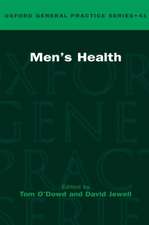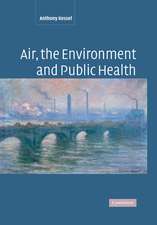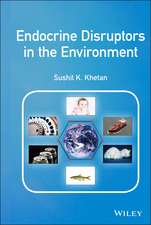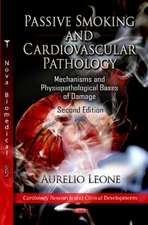Health Protection: Principles and practice
Editat de Samuel Ghebrehewet, Alex G. Stewart, David Baxter, Paul Shears, David Conrad, Merav Klineren Limba Engleză Paperback – 25 aug 2016
Preț: 406.95 lei
Preț vechi: 466.92 lei
-13% Nou
Puncte Express: 610
Preț estimativ în valută:
77.87€ • 81.30$ • 64.45£
77.87€ • 81.30$ • 64.45£
Carte tipărită la comandă
Livrare economică 25-31 martie
Livrare express 01-07 martie pentru 84.55 lei
Preluare comenzi: 021 569.72.76
Specificații
ISBN-13: 9780198745471
ISBN-10: 0198745478
Pagini: 474
Dimensiuni: 171 x 246 x 25 mm
Greutate: 0.84 kg
Editura: OUP OXFORD
Colecția OUP Oxford
Locul publicării:Oxford, United Kingdom
ISBN-10: 0198745478
Pagini: 474
Dimensiuni: 171 x 246 x 25 mm
Greutate: 0.84 kg
Editura: OUP OXFORD
Colecția OUP Oxford
Locul publicării:Oxford, United Kingdom
Recenzii
Overall, I would recommend [Health Protection: Principles and Practice] as an introduction, easy refresher and handy quick reference.
Health Protection: Principles and Practice is likely to be of value to a wider, global audience because of its all-hazards scope: it covers communicable disease surveillance/control, emergency preparedness, resilience and response, and environmental public health activities that in many countries are the responsibility of different organisations.
This book is easy both to read and to use as a day-to-day reference. Use of sub-sections and bullet points makes it easy for the reader to quickly locate the desired information. In many chapters scenarios are used to put the reader into real life situations. I think that these would be particularly valuable as a teaching aid for trainees, but they are relevant to all readers.
The book contains useful case studies on dealing with outbreaks and more than a hundred health protection checklists crossing the gamut of injections disease from avian influenza to viral haemorrhagic fevers. It would be more than worth its price for these alone.
This book was really well thought out. To an impressive degree, because many textbooks are dense, wordy, appealing to an enthusiast for the subject, but a slog for non-experts. By contrast, this one seems designed precisely to meet all the needs of someone on their first day in a health protection job, worried they will be faced with a really difficult scenario.
Health Protection: Principles and Practice is likely to be of value to a wider, global audience because of its all-hazards scope: it covers communicable disease surveillance/control, emergency preparedness, resilience and response, and environmental public health activities that in many countries are the responsibility of different organisations.
This book is easy both to read and to use as a day-to-day reference. Use of sub-sections and bullet points makes it easy for the reader to quickly locate the desired information. In many chapters scenarios are used to put the reader into real life situations. I think that these would be particularly valuable as a teaching aid for trainees, but they are relevant to all readers.
The book contains useful case studies on dealing with outbreaks and more than a hundred health protection checklists crossing the gamut of injections disease from avian influenza to viral haemorrhagic fevers. It would be more than worth its price for these alone.
This book was really well thought out. To an impressive degree, because many textbooks are dense, wordy, appealing to an enthusiast for the subject, but a slog for non-experts. By contrast, this one seems designed precisely to meet all the needs of someone on their first day in a health protection job, worried they will be faced with a really difficult scenario.
Notă biografică
Dr Ghebrehewet is Director of Health Protection in Cheshire and Merseyside, UK. He graduated from medical school in Ethiopia, where he worked as a GP and Regional Director of Public Health Programmes. Dr Ghebrehewet has extensive experience in communicable disease control and health protection, with specialist interests in immunisation, Emergency Preparedness Resilience and Response (EPRR) and environmental public health practice. He has published widely, presented at regional, national and international conferences and is the lead for Health Protection in the Masters of Public Health at the University of Liverpool and lead public health trainer in Cheshire & Merseyside. Dr Stewart is a Glaswegian born, bred and educated. Following a successful career of around 20 years in the northern mountains of Pakistan as a rural GP, Alex returned to the UK where he trained in Public Health in Cheshire and Merseyside. He was a Consultant in Health Protection for eleven years, with special interest in the acute and long-term effects of the environment on health. He has investigated and responded to many complex public health issues, and has developed an understanding of how to support local and national agencies and the public in the face of limited information, incomplete understanding and often great uncertainty.Dr Baxter has been a Consultant in Communicable Disease Control for 20 years, working in the Stockport and Greater Manchester area. Over the last 25 years he has run successfully the UK National Immunisation Conference for Health Care Workers; provided a specialist immunisation clinics at the District General Hospital seeing around 15,000 patients; and led childhood and adult immunisation programmes and training in Stockport. During this time, Dr Baxter contributed to the delivery of a consistently high childhood immunisation uptake rates, and Stockport achieved highest influenza vaccination uptake in pregnant women in the country over the last four years. Dr Baxter has published widely and supervised several PhD theses. Dr Shears is former consultant microbiologist and Director of Infection Control Arrowe Park Wirral University Hospital, with a special interest in the epidemiology and control of health care associated infections. Dr Shears was previously senior lecturer in medical microbiology at Liverpool University/Liverpool School of Tropical Medicine, with postgraduate teaching responsibilities and public health microbiology projects in Sudan and Bangladesh. He was a member of WHO working groups on antimicrobial resistance, and public health laboratory development. He is the author of over 60 peer reviewed publications, has contributed chapters in several books, and is an Assistant Editor of the Journal of Hospital Infection. In the 1980's he was a medical officer in refugee programmes in Somalia, Ethiopia, Rwanda and Lebanon.David Conrad is a Consultant in Public Health at Hertfordshire County Council. He holds an honorary research post at the University of Liverpool and has published papers in several peer reviewed journals. In collaboration with colleagues from the Centre for Men's Health at Leeds Metropolitan University, he has edited three books: Men's Health: How To Do It (Radcliffe), Promoting Men's Mental Health (Radcliffe) and Sports-Based Health Interventions: Case Studies from Around the World (Springer).Dr Kliner was born and educated in Glasgow, Scotland. She graduated from University of Leeds with a degree in Medicine, and a BA in Healthcare Ethics. She has an interested in infectious diseases, and in particular TB and HIV, which developed during clinical training, guideline development work with WHO, and academic work within Good Shepherd Hospital in Swaziland, with the University of Leeds. She currently works as a Consultant in Communicable Disease Control in Greater Manchester.








